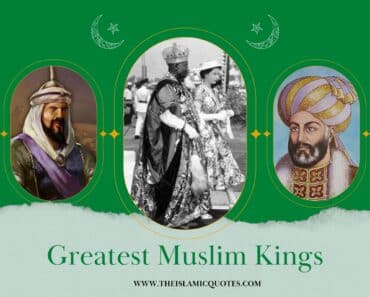Top Muslim scientists: Many Muslim scientists were pioneers in the world of science. Their contribution to scientific inventions and discoveries are valued and referred to even today.
Muslim scientists made remarkable achievements in all significant areas in different eras. Along with discoveries, many books were translated and written in diverse scientific fields.
Some of the many fields where valuable contributions were made are: Medicine, Surgery, Physics, Chemistry, Philosophy, Astrology and Geometry.
Who Are The Best Muslim Scientists?
While in our last post we talked about Top Muslim Hamd & Naat Singers, today we will focus on the 10 top Muslim scientists and their achievements.
1 – Ibn Sina (980 – 1037)
More popular by the name of Avicenna, Ibn Sina is a renowned Persian philosopher and scientist. He has made immense contributions to the field of Medicine and Aristotelian philosophy.

He composed the Book of the cure, known as Kitab al-Shifa and the canon of Medicine, Al-Qānūn fī al-ṭibb. Kitab al-Shifa is a four-part encyclopedia encompassing various topics such as logic, physics, mathematics, and metaphysics. His immense contributions to the field of medicine can be gauged from the fact that Medieval universities used his books as medical literature. He is also known by historians as the most renowned physician of the Islamic Golden Age.
2 – Abu Nasr Al-Farabi (870-950)
Abu Nasr Al-Farabi was a pioneer in sociology, psychology, and political philosophy and also has a major contribution to metaphysics, political philosophy, and ethics.

His famous books are Kitab al-musiqa al-Kabir (The Great Book of Music), al-Madina al-fadila (The Virtuous City), the Risala fi’l-‘aql (Epistle on the Intellect), Kitab al-huruf (The Book of Letters) and Kitab ihsa’ al-‘ulum (The Book of the Enumeration of the Sciences). He transmitted the doctrines of Plato and Aristotle to the Muslim world.
3 – Ali ibn Isa al-Kahhal (fl. 1010 AD)
Ali ibn Isa al-Kahhal has to his honour being a Pioneer in Ophthalmology. His extensive work includes various eye disorders, their treatments and illustration of eye anatomy. He was commonly known in medieval Europe as Jesu Occultist.

He wrote the book Memorandum of the Occultists which covered the topic way ahead of his time and for the first time in the literature, a surgical anesthetic was prescribed.
4 – Muhammad ibn Musa AL-Khwarizmi (780 – 850)
Al Khwarizmi was a renowned Muslim Mathematician from Persia. He used algebra to solve mathematical operations e.g. balancing equations to make day-to-day problem-solving easy. He also introduced a guide to the numbering system using only 10 digits i.e 0 to 9 (developed from the Indian Brahmi system).

Also known as one of the fathers of Algebra, he contributed to algebraic equations and linear equations in addition to trigonometry, geography and astronomy.
5 – Ammar ibn Ali Al-Mawsili (900-1000)
Ammar ibn Ali Al-Mawsili, another famous Arab ophthalmologist invented the hypodermic syringe, a breakthrough in medicine. Specifically, in the cataract surgery, he introduced how to use a hollow needle without affecting other organs.
During the reign of the Fatimid caliph al-Hakim bi-Amr Allah, he wrote the book Kitāb al-muntakhab fī ilm al-ayn (The book of choice in ophthalmology).
6 – Al-Hasan Ibn Al-Haytham (354 -430 )
Also being knows as the Father of Modern Optics, Al-Hasan Ibn Al-Haytham wrote the Book of Optics (Kitab al-Manazir), revealing a scientific understanding of light and vision. The book also has a Latin translation (De Aspectibus). His ideas influenced European scholars including those of the European Renaissance. He is known in the West as “Alhazen” and his views had a great impact on scholars in European Renaissance.

Being known as the “Father of modern Optics”, he also has significant contributions regarding ‘the scientific method’. I.e testing hypotheses through in-depth observation and experiments.
7 – Al-Battani (858 – 929)
Al-Battani is also known as Albatenius. Not only was he a great Arab mathematician but also a scientist and astronomer. He applied trigonometrical methods which gave an important perspective, For example for right-angled triangles, he used the formula b \sin(A) = a \sin(90° – A)bsin(A)=asin(90°−A).

Amongst many contributions, he has to his credit cataloging 489 stars, improving existing values for the length of the year and of the seasons which is 365 days 5 hours 46 minutes 24 seconds, and of the seasons. He calculated 54.5″ per year for the precession of the equinoxes and obtained the value of 23° 35′ for the inclination of the ecliptic.
8 – Ibn al-Baytar (1197-1248 )
Ibn al-Baytar was a popular pharmacist and botanist. He enjoyed his early career in Spain and later travelled across the North African coast. During his travel, he collected various herbs to be used as medicine.
Ibn al-Baytar also became chief herbalist for the governor of Egypt. He wrote the book Kitab al-jami fi al-adwiya al-mufrada, which mentions 1,400 plants for medical use. Ibn al-Baytar’s other book, Kitab al-mlughni fi al-adwiya almufrada, discusses the use of various drugs in the treatment of various diseases.
9 – Jabir Ibn Hayyan (721-815 )
Abu Musa Jabir Ibn Hayyan Al-Azdi is also known as al-Harrani and al-Sufi. In the West, he is also commonly known as Geber. He is the founder of Arab chemistry and modern pharmacy.

He wrote around three hundred books on philosophy, thousand and three hundred books on mechanical devices and hundreds of books on alchemy. He also has to his credit for being among the first few scientists who systematically classify chemical substances.
10 – Abu Bakr Al-Razi (865-935)
Abu Bakr Al-Razi was a Persian Physician who was the Pioneer in Medical science. His notable discovery was to distinguish smallpox and measles, though people at those times weren’t convinced.

He also wrote the first book on pediatrics. With his strong belief in empirical evidence rather than magic or superstitions, he also had many students whom he taught how to treat patients.
Most Famous Female Muslim Scientist
Islam as a religion has put equal emphasis on the education of both men and women. This women’s empowerment is what has allowed many Muslim women in history to leave their mark. When we talk about female Muslim scientists, we must mention Dr Rana Dajani, a Palestinian-Jordanian molecular biologist who ranks amongst the top 15 of the ‘The World’s 100 Most Powerful Arab Women’ list. The focus of her research work has been on genetics, molecular biology and stem cells.
Muslim Scientist who Won Nobel Prize
Abdus Salam (1926-1996) was a Pakistani and the first Muslim to ever win a Nobel prize for Physics in 1979. However, due to his religious beliefs (being an Ahmedi), he is not celebrated by most Muslim communities.
Frequently Asked Questions
Q. Who is the greatest Muslim scientist?
Many great Muslim scientists’ contributions to modern-day science can not be ignored. Some prominent scientists are Ibn Sina, Abu Nasr Al-Farabi, Jabir Ibn Hayyan, Ibn al- Baytar and Al-Hasan ibn Al-Haytham.
Q. What are some achievements of Muslim scientists?
Amongst the many achievements of Muslim scientists are The elephant clock, The obscure camera, Al-Idrisi’s world map, The Banu Musa brothers’ “ingenious devices”, Al-Zahrawi’s surgical instruments and Ibn Firnas’ flying contraption.
Q. Who is the father of modern scientific methodology?
Ibn al-Haytham from Iraq, a polymath, is considered to be the father of modern scientific methodology. He laid emphasis on experimental data and on the reproducibility of its results.
Q. What was the most important Muslim scientific achievement?
One of the most significant contributions of Muslim Scientists to modern science is the translation of mathematical, medical, and astronomical texts from their original languages. Also, During the Islamic golden age, Arab scholars saved and translated classic works of antiquity into various languages. This translation has assisted many researchers to date.
Q. What are the scientific conributions by Muslim in Islamic golden age?
Islamic Golden Age in Islam is referred to as the rise of Islam and the establishment of the first Islamic state in 622. During this era, Muslim Scientists advanced in the fields of algebra, calculus, geometry, chemistry, biology, medicine, and astronomy.






